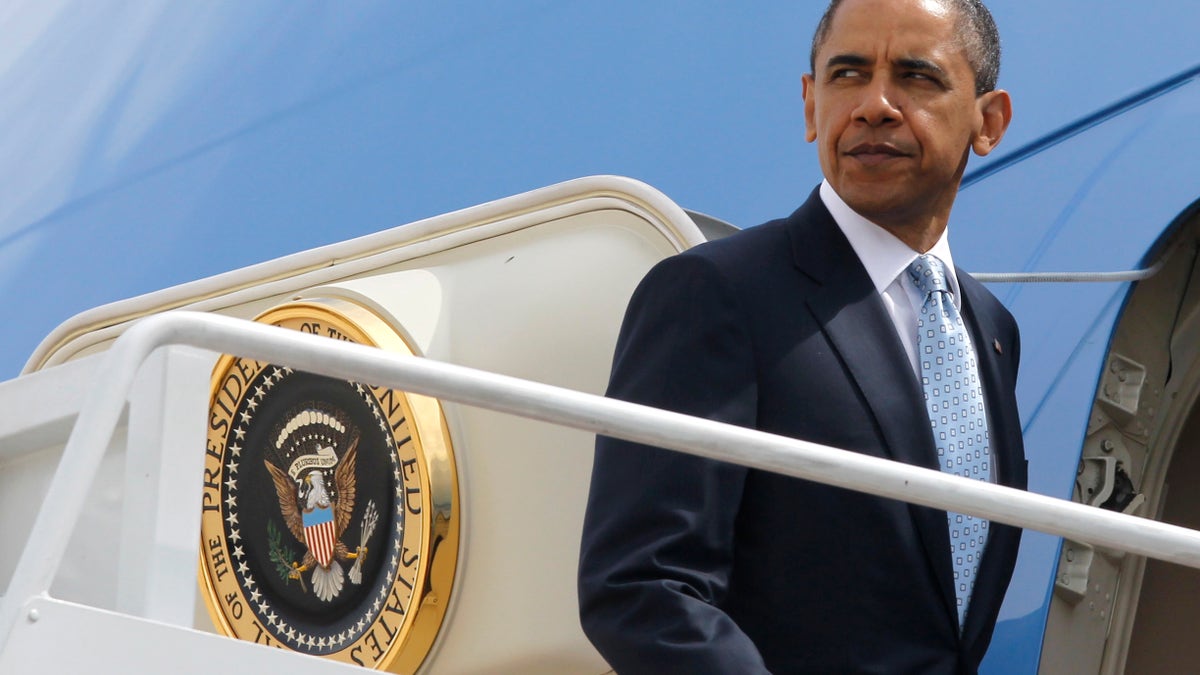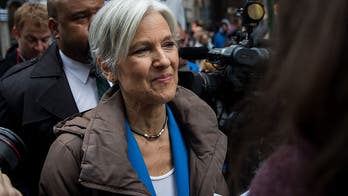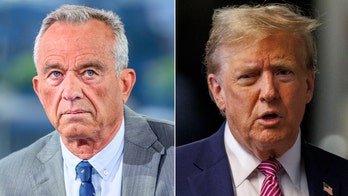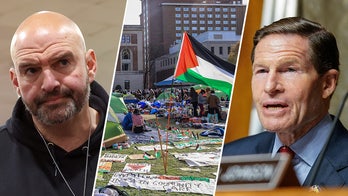
May 10: President Obama boards Air Force One at Andrews Air Force Base, Md. (AP2011)
WASHINGTON -- Eighteen months ahead of the 2012 election, President Obama is took his Usama bin Laden victory tour to the U.S.-Mexico border, where he tried to place the focus on immigration reform -- and at the same time put some distance between himself and an issue that even the death of the world's most wanted man can't obscure: the growing U.S. deficit.
A bipartisan group of legislators was returning for budget talks Tuesday with Vice President Biden to negotiate the terms for increasing the nation's ability to borrow. House Speaker John Boehner is demanding trillions of dollars in spending cuts as a condition for Republican support while House Minority Leader Steny Hoyer expressed concern that the debt limit not turn into a political hot potato in the 2012 election.
Meanwhile, Democrats are demanding an end to tax subsidies for large oil companies as the party mounts its assault on Rep. Paul Ryan over plans to revamp Medicare in part by adding a means-testing formula.
At the same time, lawmakers are moving forward with balanced budget amendment proposals, including a Republican plan to reach balance in 10 years without raising taxes and offering "a modest surplus by 2021."
Even the Gulf of Mexico workforce and funding emergency management of natural disasters in Mississippi, Alabama and elsewhere have taken priority in Congress, which is already slow-walking the path to fiscal sanity.
So it's no wonder calls to revive legislation to remake the nation's immigration laws will likely land with a thud as Obama tries to cast the GOP as the obstacle standing in the way of reforms that Congress is unlikely to consider at any time before the 2012 election.
The president's speech in El Paso, Texas, on Tuesday, and his visit to a border crossing there, are the latest high-profile immigration events by the president, who recently hosted meetings at the White House with Latino lawmakers, movie stars and others. He is attending an Hispanic prayer breakfast later in the week.
With Hispanics making up the largest growing segment of voters -- 21.3 million eligible voters in 2010 totaling 6.9 percent of all registered voters, according to the Pew Hispanic Center -- a push to help legitimize 11 million illegal immigrants could be a lucrative path to re-election.
On the face of it, the president's trip has led to criticism that the effort is little more than politics in pursuit of the ever-growing Hispanic electorate ahead of the 2012 election. White House officials dispute that. They acknowledge the difficulties in getting a bill but say it's likelier to happen if the president creates public support for immigration legislation, leading to pressure on Republican lawmakers.
"We already know from the first two years, the last Congress, that there was political opposition to comprehensive immigration reform, including from some places where there used to be political support," said presidential spokesman Jay Carney. "We are endeavoring to change that dynamic by rallying public support, by raising public awareness about the need for comprehensive immigration reform."
At the same time, the strategy allows Obama to argue that Republicans are standing in the way of an immigration bill -- shifting responsibility away from himself at a time when many Latino activists say he never made good on his campaign promise of prioritizing immigration legislation early on.
Alfonso Aguilar, executive director of the Latino Partnership for Conservative Principles and a former aide to President George W. Bush, said the president's trip makes for "nice theatrics."
Aguilar said a national consensus does support dealing with immigration, but the president is more focused on "the numbers." The president's approval ratings among Hispanics has plummeted since he took office, Aguilar said, because of unfulfilled campaign promises, including a lack of job creation and an unemployment rate that is higher than the national average.
Obama's spotty immigration record in the eyes of Latino voters makes it all the more politically imperative for him to shore up their support with his re-election campaign approaching.
The president has picked hostile political territory to make his pitch, visiting a state he lost by more than 10 percentage points in 2008. But the trip does have one overtly political upside: Obama plans a side trip to the relatively liberal bastion of Austin to raise money for the Democratic National Committee at two fundraisers Tuesday night.
"It seems President Obama has once again put on his campaigner-in-chief hat. The president's push to legalize millions of illegal immigrants is purely political," said Rep. Lamar Smith, R-Texas, chairman of the House Judiciary Committee. "And even though administration officials like to pretend the border is secure, the reality is that it isn't."
But Obama is pitching his immigration argument to the larger public, refining it in a way that goes to Americans' pocketbook concerns. White House officials say Obama will emphasize the economic value of reforming immigration laws, noting that immigrants account for a substantial share of business start-ups and patent applications, among other things -- activities that create jobs for everyone.
It's a different approach than talking about immigration as a security issue or a moral one, and also provides a counter to the Republican argument that illegal immigrants drain U.S. resources.
Arizona Gov. Jan Brewer, a Republican battling the administration over state rules to enforce federal immigration law, suggested the president's visit will not shore up his flagging image as weak on border security.
"He's going to be talking about comprehensive immigration. Well, that's not going to sell in Arizona. I don't think it's going to sell in America. I believe he's doing it for political reasons. And I think that no one wants to talk about any of these other issues until we get our borders secured, period," she told Fox News Monday night
The president argued, however, that his administration has made great strides on border security. Administration officials boast of increasing the number of agents on the border, seizing more contraband and nearing completion of a border fence, and say they plan to extend the deployment of National Guard troops Obama sent to the border. To Republicans who say that immigration overhaul legislation shouldn't happen until the border is secure, the White House now says it's as secure as it's ever been and the conversation on legislation needs to happen.
Obama pushed Tuesday for immigration legislation and released a blueprint on his approach to reform, but without setting out any timeline. Indeed, getting immigration reform done any time soon is not realistic. Obama wasn't even able to get legislation through Congress last year that would have provided a route to legal status for college students and others who were brought to the country as children. The so-called DREAM Act passed the House, then controlled by Democrats, but was blocked by Senate Republicans.
The Senate is now even more heavily Republican, and Republicans control the House. That means immigration reform can't happen unless they cooperate.
Brendan Buck, spokesman for House Speaker John Boehner, R-Ohio, said that House Republicans had no plans to take up immigration legislation and argued that if Obama were serious about immigration reform he would have reached out to Boehner on the issue, which Buck said he hasn't.
The Associated Press contributed to this report.




